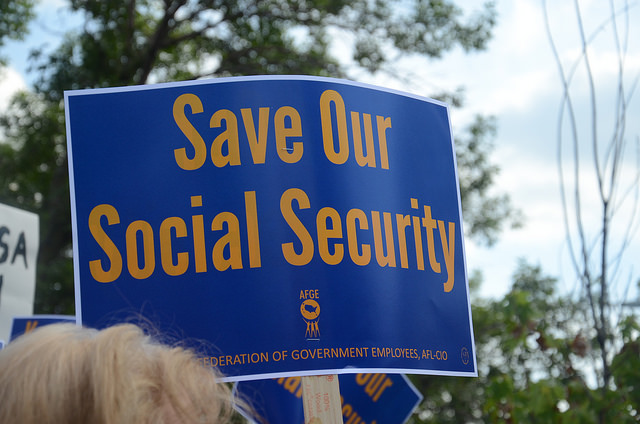Last week, Congressman John Larson of Connecticut, and 156 other congressional Democrats reintroduced a bill in the U.S. House of Representatives to expand Social Security benefits. (There were 157 original sponsors, including Larson. In just the last few days, one additional member has joined.) More than 80 percent of the Democrats in the House sponsored the bill, responding to what the public wants. Right now, there are no Republican co-sponsors. Will Republicans sign on?
The Social Security 2100 Act, H.R. 1902, would ensure that Social Security had the funding to pay more generous benefits in full through the end of this century. Beginning in 2018, it would increase Social Security benefits for everyone by around 2 percent. It would also rely on an annual cost of living adjustment specifically geared to reflect the spending patterns of older people.
Today, the Social Security cost-of-living adjustment does not properly reflect increasing costs to older adults and people with disabilities. It does not take into account that they use far more health care services than working people, and health care cost inflation is greater than other costs.
The Social Security 2100 Act would address our retirement crisis, helping to ensure the retirement security of tens of millions of Americans currently at risk of not being able to meet basic needs once they stop working. It sets the minimum benefit for Social Security at 125 percent of the federal poverty level. It affords working families greater economic security, strengthening the middle class.
In recognition that Social Security’s old age, disability, and survivor benefits are intertwined, generated from a common benefit formula, the Larson bill combines its two trust funds into one. This is a commonsense, long overdue change that simplifies and streamlines Social Security.
The Social Security 2100 Act pays for all the improvements, while restoring the program to long-range balance by requiring the wealthiest Americans–the top 0.4 percent–to make Social Security contributions on earned income over $400,000 and by gradually increasing the Social Security contribution rate by 1.2 percent, from 6.2 percent to 7.4 percent, between 2019 and 2042. That amounts to a .05 percent increase each year–or the equivalent of 50 cents a week for someone earning $50,000. Polls and surveys show that Americans are willing to pay more to ensure that Social Security remains strong.
If Republicans listen to their base, their constituents, the people they represent in Congress, they will join with Congressman Larson and the Congressional Democrats supporting this bill, helping to improve economic security in America.
If you want Congress to expand Social Security, please sign this petition.
Here’s more from Just Care:
- Four key differences between traditional Medicare and a Medicare Advantage plan
- Medicare covers weight-loss counseling
- When to claim Social Security benefits
- Four things to know if your income is low and you have Medicare
- Free local resources to help older adults











Based on the past few years most of the SSA COLA increase is automatically swallowed up in the increasing Part B monthly premiums– net sum is a zero dollars “in pocket” increase.
…sadly one cost that is not included in the equation, which in many cities is spiralling out of control, is housing. As more people retire, particularly from low paying occupations that don’t allow for savings, the pool of available low/fixed income housing is shrinking. In many cities wait lists are upwards of five years or longer, and some are closed “indefinitely” Where I live the median rent for a 1 BR apartment is 200$ more than the average monthly SS benefit for a single person (and it isn’t one of the “big cities” or in the Bay Area either). Even the price of a studio here can exceed ones monthly benefit.
In the President’s proposed budget, deep cuts to HUD are on the table, which will effectively put an end to funding of low/fixed income housing. Should this happen, SSA would need to double the basic monthly benefit and COLAs would have to be increased to a level where they would actually do some help (instead of just cover an additional day’s bus fare or cup of coffee per month like it does now) to avoid having a large portion of our most vulnerable citizens literally kicked out on the street.
Maybe we do need a GAI like other nations are implementing. At the very least for seniors who are retired or are disabled with nothing but SS benefits to look forward to, and it should not deduct from benefits nor be taxable.
Put an end to taxing SS benefits. We already paid taxes on this money.
You nailed it…You seem to have a good comprehension of the situation & I say that as my situation is reflected well in the concerns you addressed and it’s the same or worse for MANY people I know. AND I completely agree about GAI / UBI or similar; it’s good to hear others mention the concept as that means it’s not an obscure idea anymore.
Can’t afford anything. Food minimum, housing minimum. No joy no extras. Co-pays meds and high cost of health care, insurances eat up most of income. Sad way to finish out your life.
1st it’s my money, please leave it intact. Cost of living raises should be possible.
My medication jumped from $1400 for a one-month supply to $2000 for the same medicine within one year!! Help!
If congress paid back the money they took from social security (to the tune of $2.3 TRILLION), and they paid it back at the rate of $50 million per year, it would take them 19,000 years to pay it back. That’s how much money congress took–think about it. (They have no intention of paying it back, either. I have the letters stating that fact.)
This is great as long as it’s not tied to any other agenda. The Republicans should get on board to show their willingness to work with the Democrats and then the Democrats should get back to working with the current administration instead of always finding fault. I hope this is a sincere effort and not tied to another agenda.